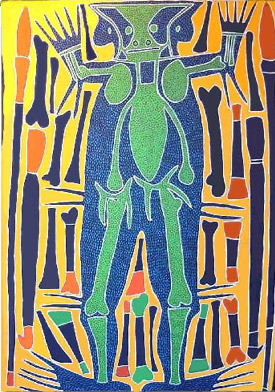
| Search JoyZine with Google Site Search! |
The Wooden Devil-Devil
They were lying on the ground in the shape of a man, but Djarapa was not satisfied. There was something wrong with them. Then he realised that his wooden man had no head. It was a long time before he could find a way to make a head, but when the spirits put a thought into his own head, he shouted with delight. Holding his flint knife firmly in his hand, he chipped at one end of the trunk until it took the shape of a head separated from the body by a thin neck. He had spent many days at work on his wooden man, but the hardest part still lay before him. Holes had to be bored through the ends of the arms and legs, and tied on to the body with cords of human hair. He hollowed out the sockets and fitted them with water-worn stones for joints. He had already cut off his wife's hair, and with infinite patience he stuck the hairs one by one to the top of the wood head. All that remained was to place two painted pebbles in sockets that he had gouged out of the face, and teeth in the cavernous mouth, and to daub the body with white and yellow clay. 'My Wulgaru!' Djarapa whispered proudly. 'The man-thing I have made with my own hands need only breath and life to make him walk like a warrior.' He chanted the most powerful incantations he knew, and tapped the figure with his woomera. The sun sank, dusk changed to dark and, daring the evil spirits of the night, Djarapa chanted and tapped without stopping on through the night and the dim light of dawn, on through the morning song of birds and the growing daylight, on and on as the sunlight dappled the ground under the trees; and all the time the Wulgaru lay motionless, unresponsive to the chanting, staring upwards with its stony eyes. Long shadows of the late afternoon lay across the tiny clearing. Djarapa straightened himself slowly and painfully. In a fit of petulance he kicked the wooden figure and walked along the track to his camp. 'Thud, thud, thud!' He stopped and listened, but could hear nothing; but as soon as he began walking again, he could hear the unusual thudding noise. He stopped for a second time, and the noise ceased. His senses thoroughly roused, he walked on, moving silently, with his ears strained to catch the slightest sound. He heard it again. It was a mixture of noises or heavy footsteps, a grating sound like wood and stone rubbing together, a ringing clash like the teeth of a crocodile when he misses his prey, a breaking of branches and rustling of leaves. The path lay straight in front of him. Djarapa marched steadily along it without turning his head. When he came to the end he whirled round and saw his Wulgaru striding towards him. The wood figure was snapping its jaws and crashing through the overhanging branches. It came to a halt, and in its stony eyes there was a malevolence that chilled Djarapa's heart. So there began a long chase in which Djarapa the woodcarver was hunted by the thing he had created. Relentlessly it pursued him. Djarapa's brain was racing faster than his feet. He turned a corner, and in the few moments that he was out of sight of his pursuer, he plunged into a screen of foliage and took shelter behind the trunk of a tree. Peeping cautiously from his hiding place, he saw the Wulgaru running past. Startled birds flew from its path. The wooden hands clutched at them, the teeth-studded jaws clattered and clashed as loudly as the stone joints in his legs. Djarapa followed at a distance, wondering what would happen when the wooden man reached the bank of the river. The Wulgaru did not hesitate. It stepped off the bank and sank lower and lower into the water until it disappeared from sight. The man heaved a sigh of relief. He knew that the Wulgaru he had made would kill and devour him if it was able to catch him. He was about to turn away when a movement on the far bank of the river caught his eye. It was the Wulgaru climbing out of the water. It had walked across the bed of the river, unharmed by the water, and went on its way. Djarapa hurried back to his camp and told the incredible story to his tribespeople. The fires burnt brightly that night, and everyone lived in fear, as well they might, for neither fire nor water, spear nor magic spell could harm the Wulgaru. It is a living man, but it does not breathe; it is a devil-devil, but it has the form of a man; it is only the trunk of a tree and a few river stones, but it has life and movement. It is Wulgaru, the devil-devil which still lives, and will live forever, the devil-devil which kills men and women and children who break the tribal laws, but which has never been known to touch those who obey. A.W. Reed, Aboriginal Fables & Legendary Tales (Aboriginal Library) |
